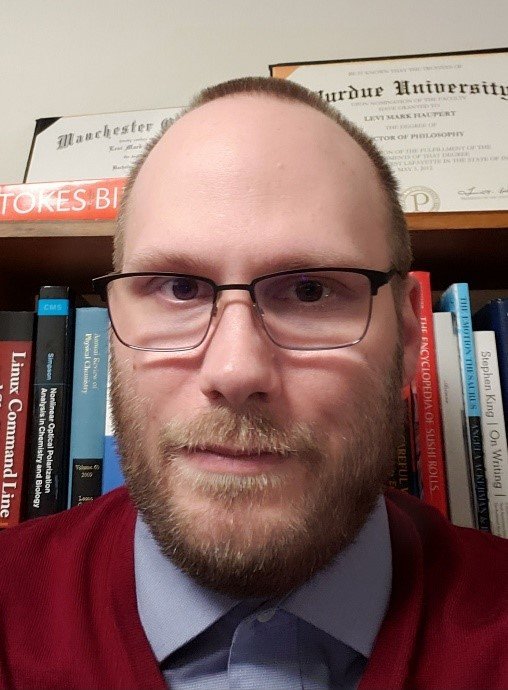Meet EPA Scientist Levi Haupert, Ph.D.

Dr. Levi Haupert is a physical scientist that studies the movement of chemicals such as benzene and per- and polyfluoroalkyl substances (PFAS) inside plastic drinking water pipes and porous particles such as granular activated carbons and ion exchange resins. He uses laboratory experiments and computer models to study the sampling and remediation of plastic drinking water pipes that have been exposed to benzene, which has contaminated several water systems damaged by catastrophic wildfires. He also uses mathematical diffusion models to better understand the treatment of drinking water for PFAS by ion exchange and granular activated carbon filters.
Tell us about your background.
I grew up in a house between a corn field and a cattle pasture in rural Indiana. I earned my bachelor’s degree in chemistry from Manchester University, a small college about twenty miles from my house. I went on to study quantum mechanics and ultrafast optics at Purdue University. Basically, I ran computer simulations and shot expensive lasers at tiny crystals for my Ph.D.
When did you first know you wanted to be a scientist?
As a child, I enjoyed watching documentaries about nature and space exploration. I have always been curious about how the world works and why people behave the way they do. However, it wasn’t until my summer internship testing battery prototypes at NASA that I realized that I wanted to be a scientist rather than just a fan or a spectator of science.
How does your science matter?
Having safe water to drink is a basic human need—one that is often taken for granted even though it is constantly threatened by contaminants both new and old. My research helps people identify and combat these important threats to human health.
What do you like most about your research?
I enjoy having a variety of things to do. On any given day, I could be writing a paper, giving a presentation at a conference, running an experiment in the lab, or battling some unruly computer code. There is always something new and different to learn.
If you could have dinner with any scientist, past or present, who would it be and what would you talk about?
I would have dinner with physicist and statistician Edwin Thompson Jaynes. I would ask him at least a hundred questions about his unfinished book “Probability Theory: The Logic of Science.”
If you could have one superpower, what would it be and why?
I often find myself thinking that there simply aren’t enough hours in the day to do everything I want (or need) to do. I am tempted to pick time travel as my one superpower, but I am terrified of the mind-bending paradoxes that would lead to. As an alternative, I would be willing to settle for simply not having to sleep as a way of adding a few hours to every day.
Any advice for students considering a career in science?
Be prepared to cope with being wrong. Scientists make mistakes all the time because they are working on new, difficult problems. This can come as a shock, especially to students that are used to getting high marks in a typical school setting. Also, remember that some of the most important learning in science happens when things don’t go as expected.
What do you think is our biggest scientific challenge in the next 20/50/100 years?
There is a growing need to find a scientific communication and peer review system that is sustainable and works for scientists, publishers, and the public. Currently, the two most common options scientists have for publishing their work are subscription-based journals and open access publishers. Each of these options presents its own set of problems.
Whose work in your scientific field are you most impressed by?
I am always impressed when someone’s research is so focused and so comprehensive that they are able the write “the book” on a topic. It’s even more impressive when that book stands the test of time. For example, Friedrich G. Helfferich’s book on ion exchange is decades old, but still has not been surpassed in scope or presentation.
Editor's Note: The opinions expressed herein are those of the researcher alone. EPA does not endorse the opinions or positions expressed.
